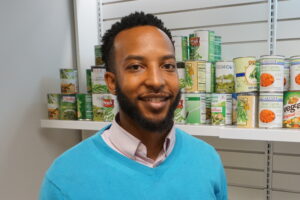Whole health focus: HSC’s student food pantry
This article is part of a series highlighting whole health initiatives on HSC’s campus.
It’s 6 p.m. and you just got out of class. You remember you need to get gas and a few groceries for the week, but rent was due this morning, and you don’t have enough money to get both gas and groceries. Since you can’t miss class, you opt to skip groceries so you can afford gas.
For many students at The University of North Texas Health Science Center at Fort Worth, this is more than a scenario, it’s a reality. The financial burden of tuition, textbooks, rent and numerous other finances can often be too much to balance, forcing students to make difficult decisions that impact their overall health and well-being.
A decision like this goes beyond the physical: It touches every aspect of a student’s whole health. If students can’t afford to feed themselves, every pillar of their whole health — mental, physical spiritual, self-care, community and financial — can suffer.
Student Food Pantry Addresses a Basic Need
The Care Team at HSC recognized that for students to be well and succeed academically, their basic needs must be addressed. In 2016, the first student food pantry was brought to campus to address those basic needs. The goal was to help eliminate the food insecurities experienced by many students.
Today, students have the option to choose between two food pantries. They can visit one of two locations: the Student Service Center, room 180, which is open from 8 a.m. to 5 p.m., or the library, room 450, which remains open as long as the library.
The food pantry is stocked primarily through donations, a community partnership with the Tarrant Area Food Bank and the HSC Community Garden. Donations of non-perishable items, such as pasta, canned vegetables and fruit, rice, beans, canned chicken/tuna, etc. are accepted. There is also a refrigerator/freezer to store cold items like produce, frozen vegetables, meat, dairy and eggs
On average, there are more than 50 visits to the food pantry each month.
“Needing to visit the food pantry in order to feed yourself is often a sensitive subject for students,” said Jeremy Joseph, director of the Student Assistant Resource Center. “Students who visit are asked to weigh and record the amount of food taken but are not required to record any identifiable information.
“Our hope is that students don’t feel ashamed for utilizing this service. It is there to help them in their time of need.”
HSC’s Student Food Pantry and Whole Health
The availability of this food pantry ties in closely with HSC’s Whole Health Initiative. Joseph and others hope the food pantry will empower students to improve their health by addressing that basic need.
“The food pantry impacts more than just access to food,” Joseph said. “The food pantry is the epitome of whole health.
“It impacts community health in an effort to address food insecurities; emphasizes self-care by encouraging students to identify and address their own fundamental nutrition needs; and aids their financial health by mitigating the burden of finding the means to get food while also paying the bills.”
Donations to the food pantry are accepted all year, and anyone can bring donations to the Student Service Center, room 800, 8 a.m.– 5 p.m., Monday-Friday. Donations are accepted as long as the food is in good condition and not expired.
The food pantry serves as a vital resource for a growing number of students as food insecurity among HSC students continues to increase. People who are food insecure may be at an increased risk for a variety of negative health outcomes and health disparities. In addition to the HSC food pantry, students can find a local food pantry in their area by visiting the website at tafb.org/find-food/#locate-food.






Social media